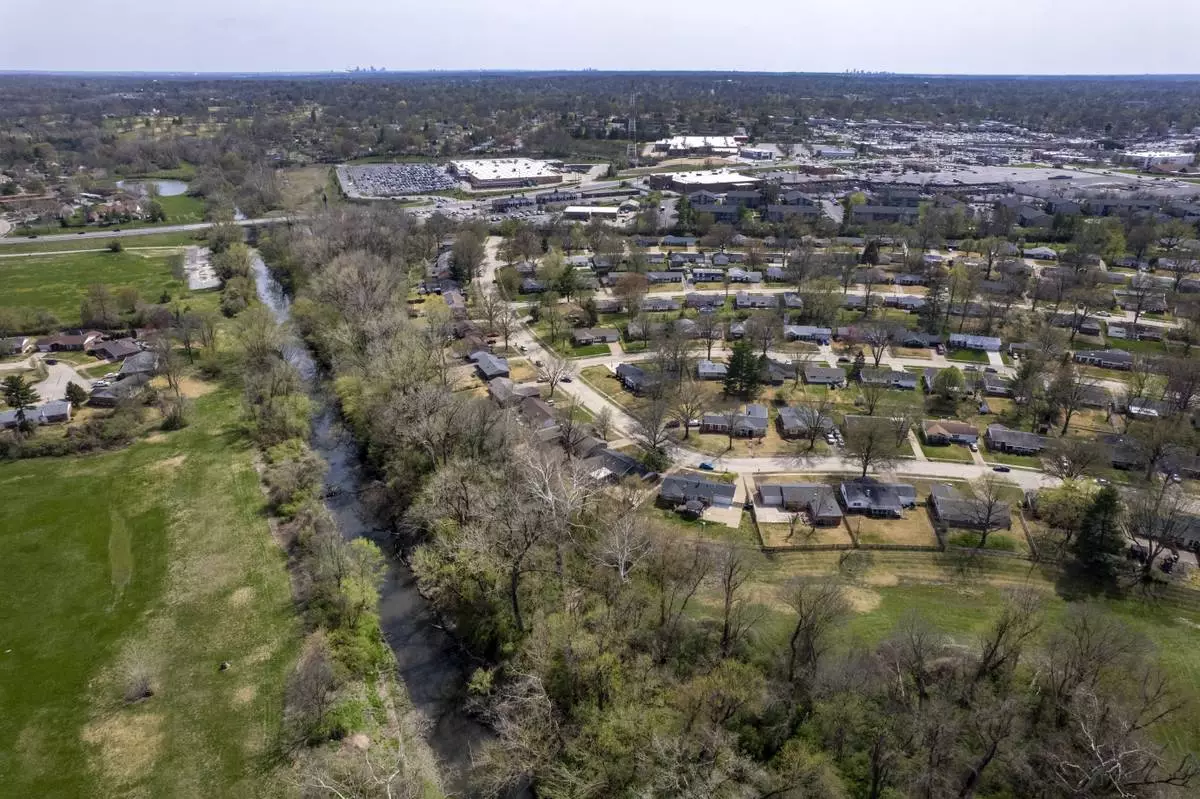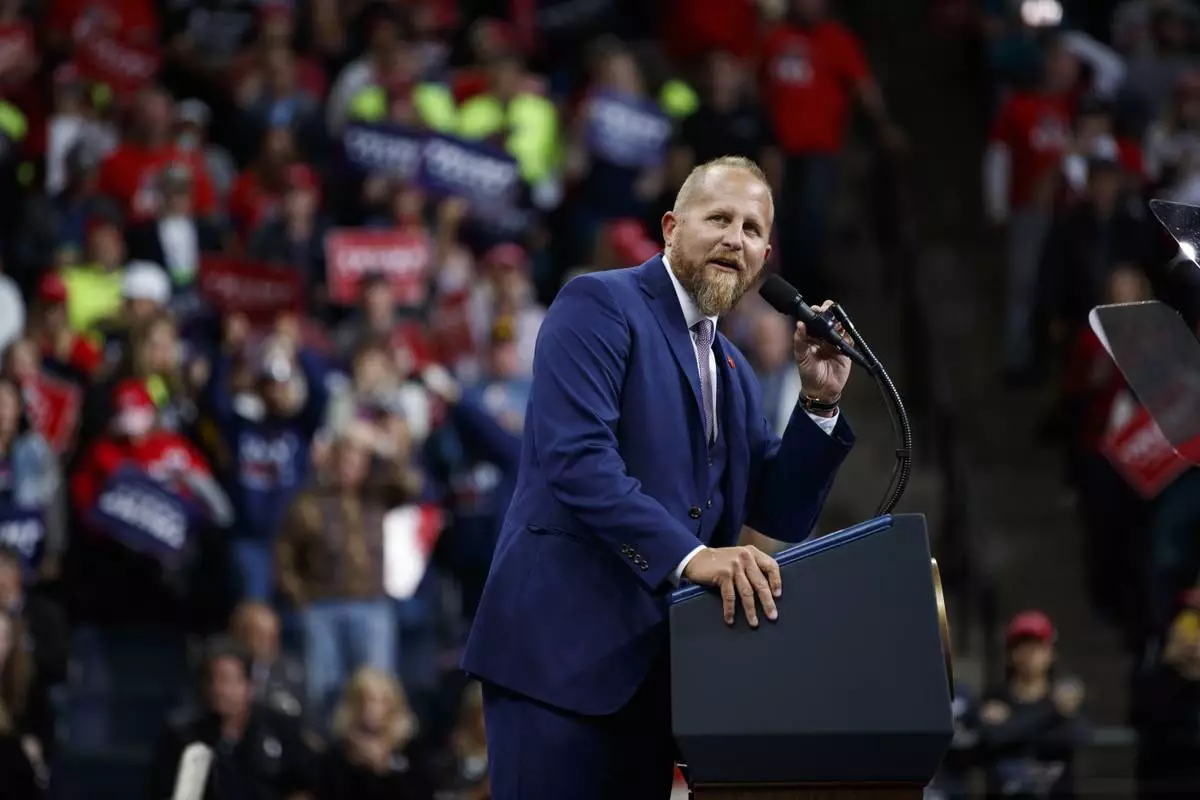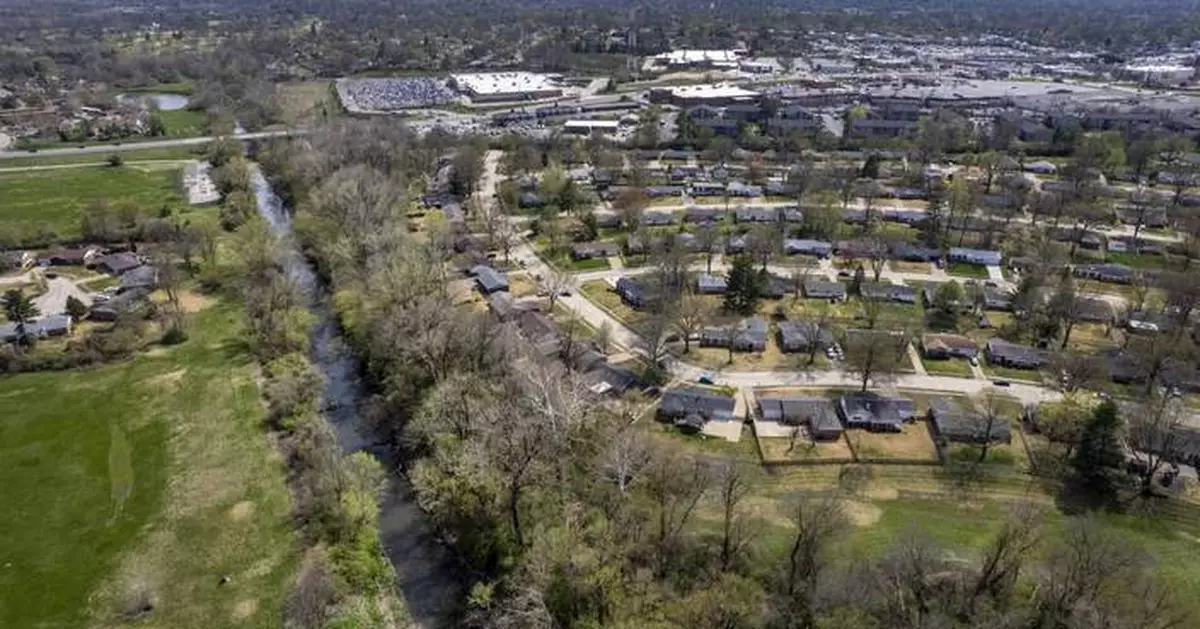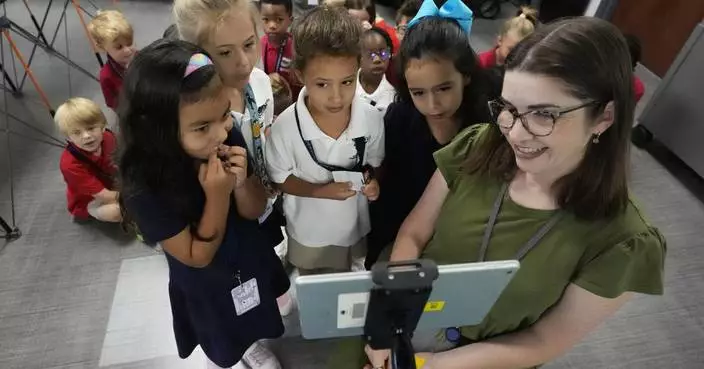Karen Nickel has been dealing with lupus and other illnesses for years, illnesses she blames on childhood exposure to a suburban St. Louis creek where Cold War-era nuclear waste was dumped decades ago. It's time, she said Friday, for the federal government to start making amends.
“People have died and are still dying,” Nickel, co-founder of the activist group Just Moms STL, said.
Nickel and others impacted by nuclear waste exposure in the St. Louis region joined Democratic U.S. Rep. Cori Bush at a news conference at a park that sits near long-contaminated Coldwater Creek. They urged renewal of a law initially passed more than three decades ago that would provide an estimated $50 billion to compensate Americans exposed to radiation by the government.
Last month, the Senate approved legislation by Republican Sen. Josh Hawley of Missouri and Democratic Sen. Ben Ray Luján of New Mexico that would not only extend the 1990 Radiation Exposure Compensation Act, but expand its scope to include Missouri and other states adversely affected by the nation’s nuclear weapons program.
But the compensation plan was excluded from a spending bill.
“The Senate did its job, but House leadership has failed to act,” Bush, of St. Louis, said. “This injustice cannot stand.”
The plan isn't dead. It could still pass as a stand-alone bill, or be attached to another piece of legislation. But time is of the essence, Bush said. The RECA program expires June 7.
Uranium processing in the St. Louis area played a pivotal role in developing the nuclear weapons that helped bring an end to World War II and provided a key defense during the Cold War. But eight decades later, the region is still dealing with contamination at several sites.
In July, an investigation published by The Associated Press, The Missouri Independent and MuckRock showed that the federal government and companies responsible for nuclear bomb production and atomic waste storage sites in the St. Louis area were aware of health risks, spills, improperly stored contaminants and other problems but often ignored them.
While it is difficult to prove definitively that the waste caused residents’ illnesses, advocates argue that there is more than enough evidence that it has sickened people.
Since the RECA program began, more than 54,000 claims have been filed and about $2.6 billion has been awarded for approved claims in Nevada, Utah and Arizona.
In New Mexico, residents in the communities surrounding the area where the first atomic bomb was detonated in 1945 — the top-secret Manhattan Project — were not warned of the radiological dangers and didn’t realize that an atomic blast was the source of the ash that was raining down upon them.
Advocates also have sought to bring awareness to the lingering effects of radiation exposure on the Navajo Nation, where millions of tons of uranium ore were extracted over decades to support U.S. nuclear activities.
President Joe Biden signed an executive order in 2022 extending RECA for two years, into June. Hawley’s bill would extend the law for five years and expand coverage to include people in Missouri as well as Idaho, Montana, Colorado, Tennessee, Kentucky, Alaska and Guam.
The White House has indicated that Biden would sign the legislation.
“The President believes we have a solemn obligation to address toxic exposure, especially among those who have been placed in harm’s way by the government’s actions,” the White House said in a statement earlier this year.
Others worry about the cost. The taxpayer advocacy group Committee for a Responsible Federal Budget said that the legislation should include budget offsets to pay for it.
Nuclear waste stored near St. Louis' Lambert Airport made its way into Coldwater Creek in the 1960s. Many people who grew up or live near the meandering creek believe the contamination is responsible for cancers and other illnesses, though experts say connecting radiation exposure to illness is complicated. Cancer concerns also have been raised by people in nearby St. Charles County, Missouri, where uranium was processed and a large quarry became contaminated, resulting in a Superfund cleanup.
In 2022, a St. Louis County grade school closed amid worries that contamination from Coldwater Creek got onto the playground and inside the building. The Army Corps of Engineers announced last month that it is testing a few homes near the creek after high radiation levels were found in their backyards.
Like Nickel, Democratic state Rep. Doug Clemens grew up along Coldwater Creek. He said every man in his childhood neighborhood eventually died of stomach or intestinal cancer.
“They knew they were poisoning us for 75 years,” Clemens said of the government. “RECA is a step. We must do RECA now.”
This story has been corrected to show the last name of the New Mexico senator is Luján.

FILE - Coldwater Creek flows Friday, April 7, 2023, in Florissant, Mo. Democratic U.S. Rep. Cori Bush and several people who grew up along a contaminated St. Louis County creek on Friday, April 5, 2024, urged the U.S. House to pass a measure that would provide compensation for those whose illnesses are believed to be connected to nuclear contamination. Coldwater Creek was contaminated decades ago when waste from nuclear bomb development was dumped into the creek. (AP Photo/Jeff Roberson, File)
FORT LAUDERDALE, Fla. (AP) — Brad Parscale was the digital guru behind Donald Trump's surprise victory in the 2016 election and was promoted to manage the 2020 campaign. But he didn't last long on that job: His personal life unraveled in public and he later texted a friend that he felt “guilty” for helping Trump win after the riot at the U.S. Capitol.
He's since become an evangelist about the power of artificial intelligence to transform how Republicans run political campaigns. And his company is working for Trump's 2024 bid, trying to help the presumptive Republican nominee take back the White House from Democratic President Joe Biden.
Here's what to know about Parscale and his new role:
Parscale says his company, Campaign Nucleus, can use AI to help generate customized emails, parse oceans of data to gauge voter sentiment and find persuadable voters. It can also amplify the social media posts of “anti-woke” influencers, according to an Associated Press review of Parscale’s public statements, his company documents, slide decks, marketing materials and other records not previously made public.
Soon, Parscale says, his company will deploy an app that harnesses AI to assist campaigns in collecting absentee ballots in the same way drivers for DoorDash or Grubhub pick up dinners from restaurants and deliver them to customers.
Parscale was a relatively unknown web designer in San Antonio, Texas, when he was hired to build a web presence for Trump's family business.
That led to a job on the future president’s 2016 campaign. He was one of its first hires and spearheaded an unorthodox digital strategy, teaming up with scandal-plagued Cambridge Analytica to help propel Trump to the White House.
“I pretty much used Facebook to get Trump elected in 2016,” Parscale said in a 2022 podcast interview.
Following Trump’s surprise win, Parscale’s influence grew. He was promoted to manage Trump's reelection bid and enjoyed celebrity status. A towering figure at 6 feet, 8 inches with a Viking-style beard, Parscale was frequently spotted at campaign rallies taking selfies with Trump supporters and signing autographs.
Parscale was replaced as campaign manager not long after a rally in Tulsa, Oklahoma, drew an unexpectedly small crowd, enraging Trump.
Since last year, Campaign Nucleus and other Parscale-linked companies have been paid more than $2.2 million by the Trump campaign, the Republican National Committee and their related political action and fundraising committees, campaign finance records show.
Parscale did not respond to questions from the AP about what he’s doing for the Trump campaign. Trump has called artificial intelligence “so scary” and “dangerous,” while his campaign, which has shied away from highlighting Parscale’s role, said in an emailed statement that it did not “engage or utilize” tools supplied by any AI company.
Parscale-linked companies have been paid to host websites, send emails, provide fundraising software and digital consulting, campaign finance records show.
The Biden campaign and Democrats are also also using AI. So far, they said they are primarily deploying the technology to help them find and motivate voters and to better identify and overcome deceptive content.
Last year, Parscale bought property in Midland, Texas, in the heart of the nation’s highest-producing oil and gas fields. It is also the hometown of Tim Dunn, a billionaire born-again evangelical who is among the state’s most influential political donors.
In April of last year, Dunn invested $5 million in a company called AiAdvertising that once bought one of Parscale’s firms under a previous corporate name. The San Antonio-based ad firm also announced that Parscale was joining as a strategic adviser, to be paid $120,000 in stock and a monthly salary of $10,000.
“Boom!” Parscale tweeted. “(AiAdvertising) finally automated the full stake of technologies used in the 2016 election that changed the world.”
AiAdvertising added two key national figures to its board: Texas investor Thomas Hicks Jr. — former co-chair of the RNC and longtime hunting buddy of Donald Trump Jr. — and former GOP congressman Jim Renacci. In January, Dunn gave AiAdvertising an additional $2.5 million via an invesment company, and AiAdvertising said in a news release that the cash infusion would help it “generate more engaging, higher-impact campaigns.”
Dunn declined to comment, and AiAdvertising did not respond to messages seeking comment.
Parscale occasionally offers glimpses of the AI future he envisions. Casting himself as an outsider to the Republican establishment, he has said he sees AI as a way to undercut elite Washington consultants, whom he described as political parasites.
In January, Parscale told a crowd assembled at a grassroots Christian event in a Pasadena, California, church that their movement needed “to have our own AI, from creative large language models and creative imagery, we need to reach our own audiences with our own distribution, our own email systems, our own texting systems, our own ability to place TV ads, and lastly we need to have our own influencers.”
—-
Burke reported from San Francisco. AP National Political Writer Steve Peoples in Washington and Associated Press researcher Rhonda Shafner in New York contributed to this report.
—-
This story is part of an Associated Press series, “The AI Campaign,” that explores the influence of artificial intelligence in the 2024 election cycle.
—-
Contact AP’s global investigative team at Investigative@ap.org or https://www.ap.org/tips/
—-
The Associated Press receives financial assistance from the Omidyar Network to support coverage of artificial intelligence and its impact on society. AP is solely responsible for all content. Find AP’s standards for working with philanthropies, a list of supporters and funded coverage areas at AP.org

FILE - Republican presidential candidate former President Donald Trump speaks at an election night rally on primary election night in Nashua, N.H., Tuesday, Jan. 23, 2024. Election experts say they are concerned about AI’s potential to upend elections around the world through convincing deepfakes and other content that could mislead voters. (AP Photo/David Goldman, File)

Pages from the Campaign Nucleus website are seen on a computer in New York on Thursday, May 2, 2024. Political consultant Brad Parscale’s company, Campaign Nucleus, is boosting fundraising and voter engagement for the Trump campaign and other right-wing causes by leveraging data science to automate how political operatives identify and motivate their supporters. (AP Photo/Patrick Sison)

FILE - Brad Parscale, then-campaign manager for President Donald Trump, speaks during a campaign rally at the Target Center in Minneapolis, Oct. 10, 2019. Parscale, the digital campaign operative who helped engineer Trump’s 2016 presidential victory, vows that his new, AI-powered platform will dramatically overhaul not just polling, but also campaigning. (AP Photo/Evan Vucci, File)













